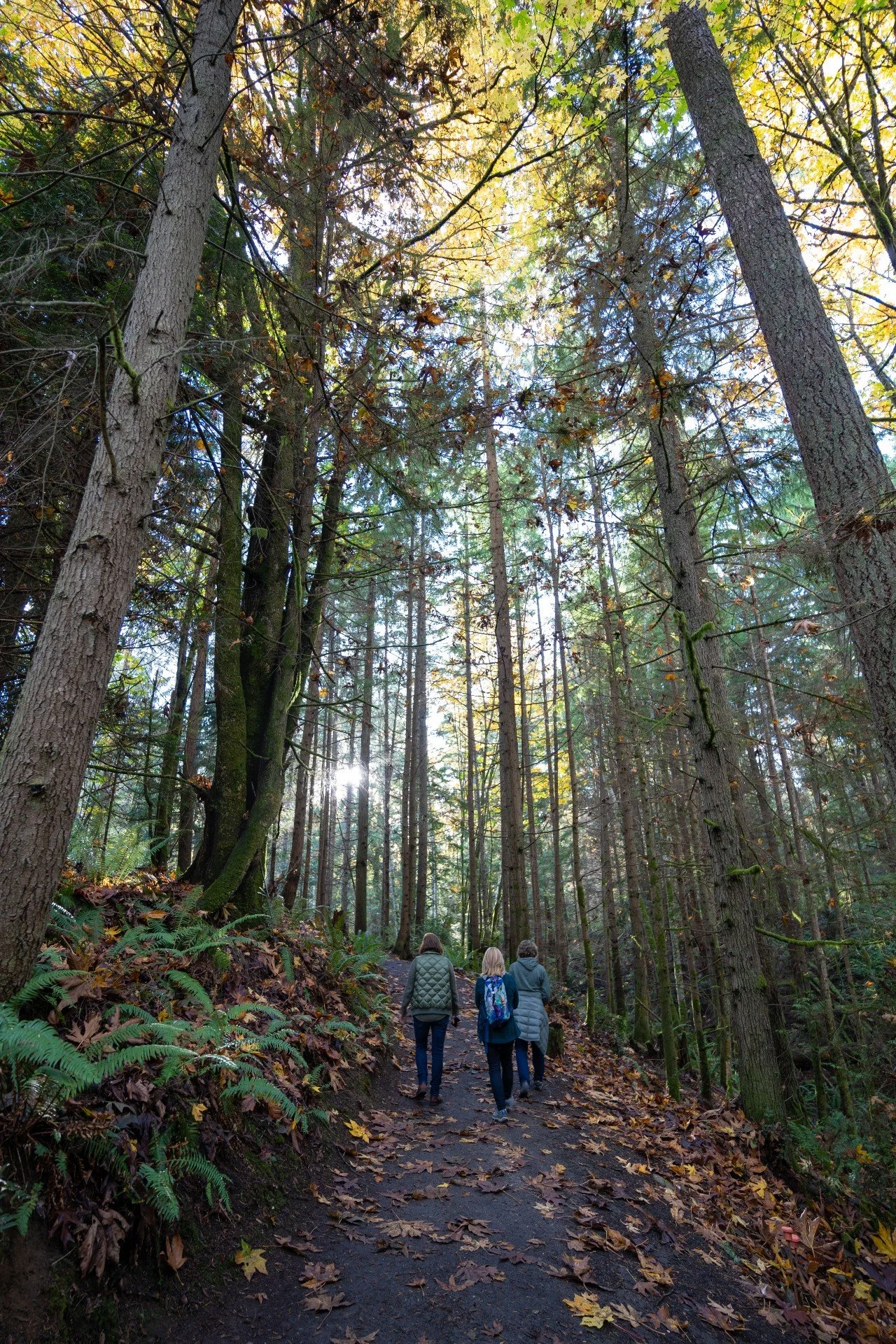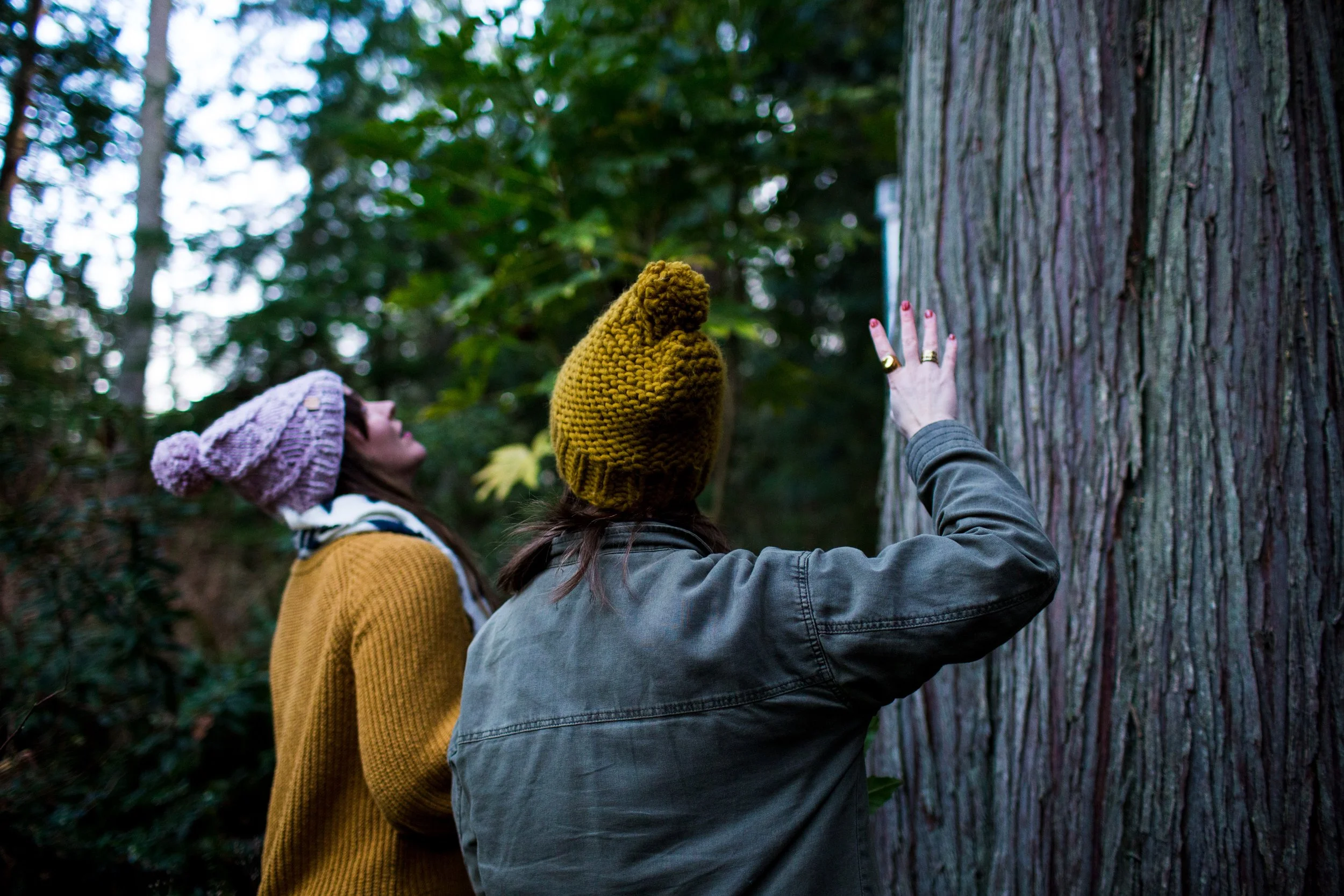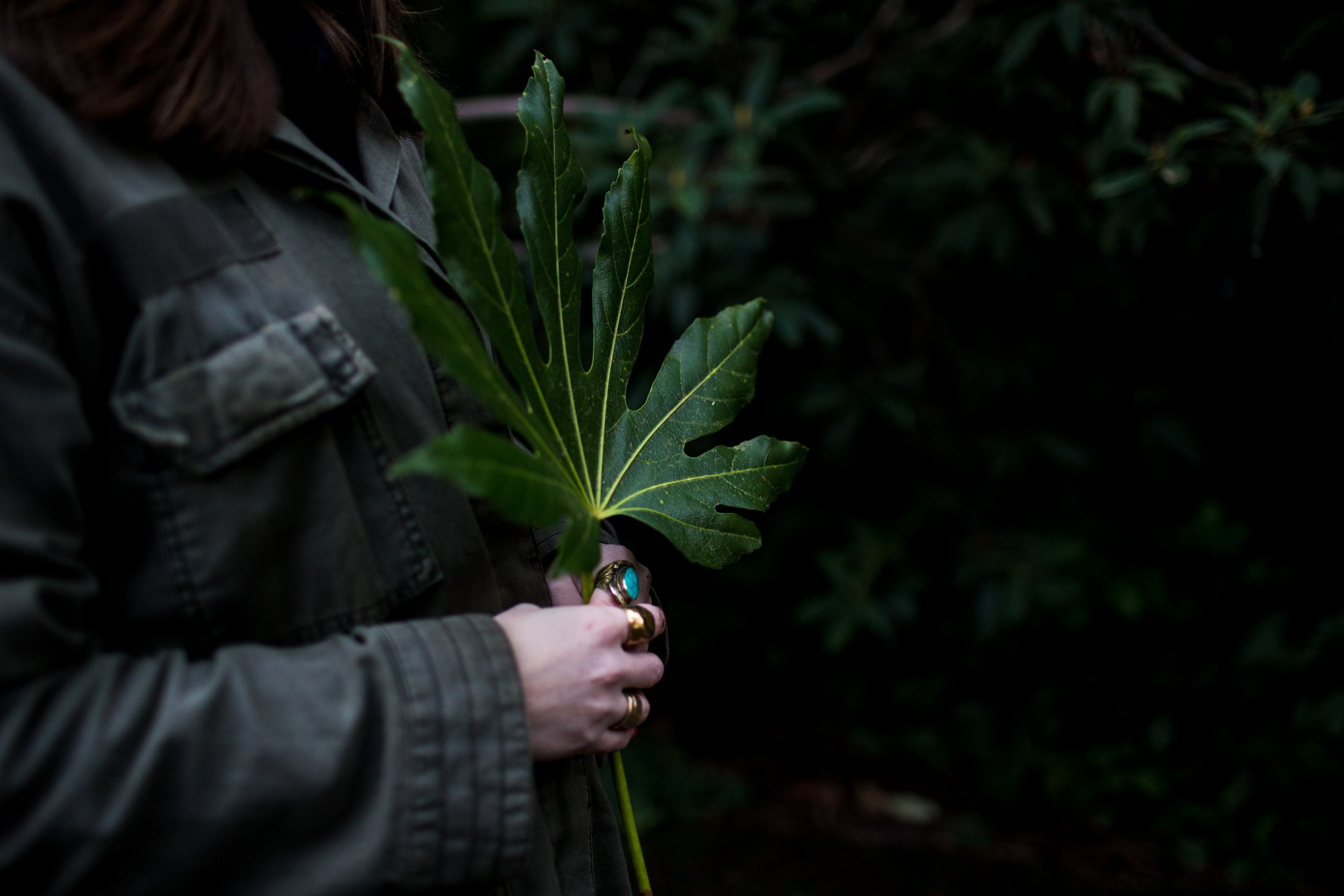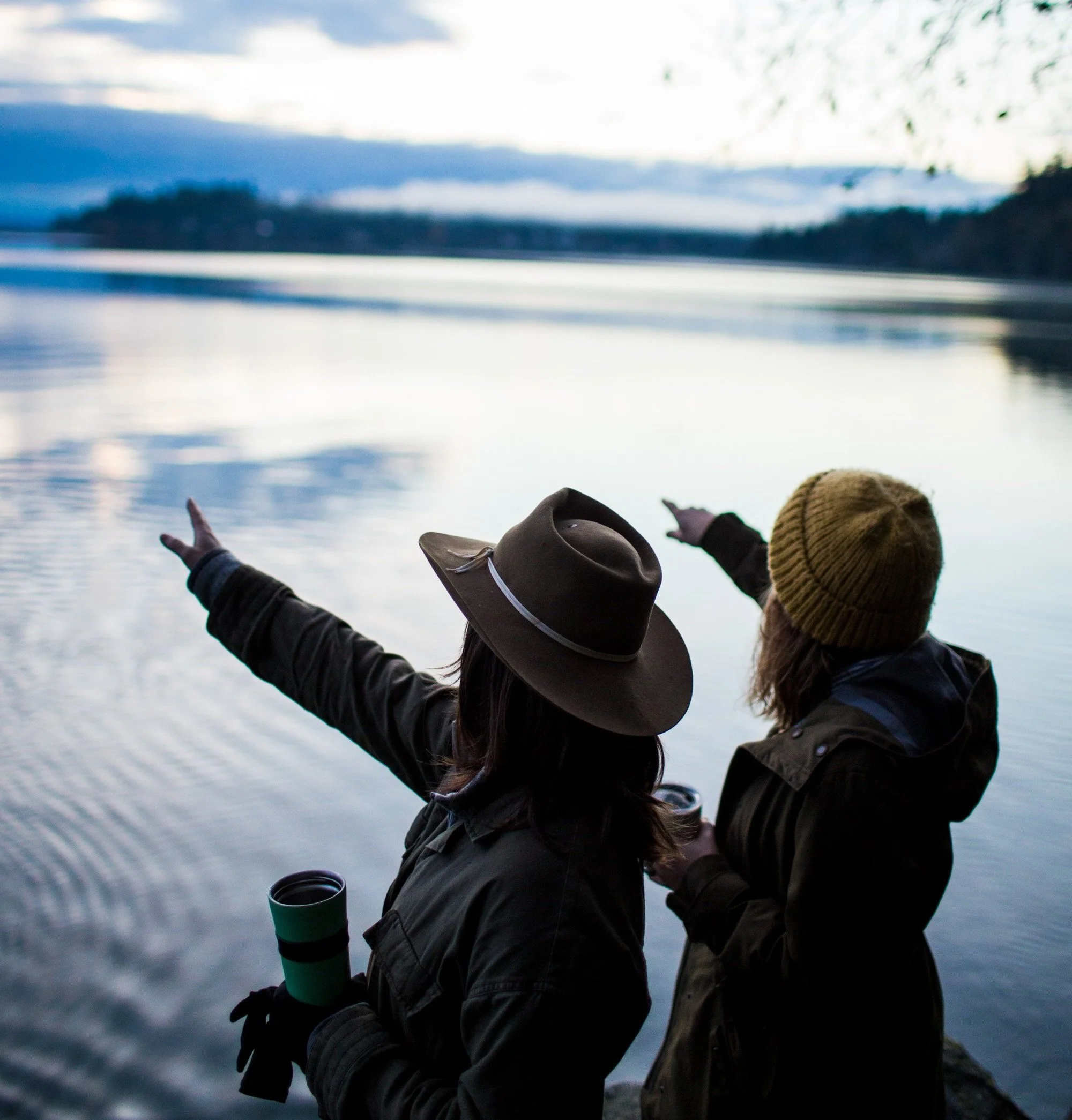the healing power of nature
Wellness retreats from the Olympics to the Puget Sound
Words by Linda Kramer Jenning
STEPH JAGGER NEEDED TO FIND A PLACE WHERE SHE COULD GATHER A DOZEN OR MORE WOMEN FOR A WELLNESS RETREAT THAT WOULD GIVE THEM A RENEWED SENSE OF HOPE BY IMMERSING THEIR BODIES, MINDS AND SPIRITS IN THE BEAUTY OF THE PACIFIC NORTHWEST.
She found it at IslandWood on Bainbridge Island. She took her participants on gentle hikes through the woods and gathered them around campfires surrounded by winds whistling through the trees.
“It really felt nurturing and nourishing,” recalls Jagger, 42, who offers a variety of coaching services. “For me, the forest contains the elements of big nature, something bigger than you to connect to. It’s awe and wonder in those spaces that is conducive to a feeling that we are being taken care of.”
It’s a feeling that many of us have been seeking since the pandemic started three years ago, and it’s led to a soaring demand for a wide spectrum of wellness retreats. They may focus on grieving or healing or, as Jagger says, “remembering who we were before life got so busy or before life took us apart in some way.”
Retreats vary in their offerings, length and size. Some start with a facilitator like Jagger who chooses a location, sets the theme, and then invites participants. Other retreats start with a venue that makes wellness the core of its mission. What they all have in common is “radical permission to take care of you,” says Jagger.
“It was four days of pause and reflection to help us live our favorite lives moving forward,” says Tina DaSilva, who came from the Chicago area to attend Jagger’s retreat at IslandWood. “It’s like a fairy tale grounded in Mother Nature. It helps you recognize and value the connection we have as humans to Mother Nature, which I think in today’s fast-paced world is hard to embrace on a day-to-day basis.”
She recalls exploring the trails twisting around the 250-acre campus and how walking across a suspension bridge through the forest evoked a sense of great calm. “You could feel in your body the ability for nature to nurture you.”
IslandWood, a nonprofit environmental education organization celebrating its 20th anniversary this year, lets retreats like Jagger’s explore six different natural ecosystems, two treehouses, a 120-foot canopy tower, a garden complete with a wood-burning oven, a large campfire circle, a sheltered lake and vistas across Blakely Harbor. Participants stay in lodges on the grounds and dine on meals featuring locally sourced ingredients.
At Harmony Hill in Union, those seeking well-being have 11 acres of woods including gardens, a lavender labyrinth and an “air phone.” For more than four decades, the nonprofit center has offered three-day retreats for people with a cancer diagnosis and their care partners.
Ann Lovejoy, renowned Bainbridge Island gardener and author, took part in several Harmony Hill retreats when her husband had cancer. She went on to become deeply involved with the center, helping to create some of its gardens. “The surroundings are so beautiful and calm and peaceful,” says Lovejoy. “All of that connection to the natural world is an important part of healing. The environment creates the opportunity to relax into a trust space that isn’t always easy to find when you are in the midst of a cancer experience. Walking through the lavender labyrinth and trailing our fingers over the plants, it wakes the senses and brings you this feeling of soothing and invigorating at the same time.”
On a cancer retreat, says Lovejoy, participants work with trained professionals and may join in meditating, singing, gentle exercise and other programs “designed for relaxation and the release of tension.” Over 4,200 people have taken part in the program—about two dozen per retreat.
Besides the cancer retreats, Harmony Hill offers retreats for groups like nurses and other medical professionals. The fees from those, along with donations, help keep the cancer programs free of charge. All retreats include room and board.
“It’s a supportive environment for anybody,'' says Lovejoy, “and I think right now everybody is as stressed out as they can be after the last few years of the pandemic. Harmony Hill is a healing environment that anybody can find restorative.”
Demand for its programs has skyrocketed since the pandemic, says Tracy Stirrett, director of Development and Communications for the center. “The need was just boundless for what we have to offer.”
“We are not nearly as alone as we think we are,” says Steph Jagger (left), pictured here looking across Puget Sound with a retreat participant.
What Harmony Hill has to offer, along with the trails and lavender labyrinth, is a hundred-year-old Japanese maple believed to be one of only four in the Pacific Northwest “that old and grand,” says Stirrett. Another unusual feature, she adds, is an air phone, a concept started in Japan for dealing with grief. The structure is made out of wood and looks like an old fashioned phone booth with a phone inside. “You pick up the phone and have a conversation with somebody you lost. People go there and express what they might be holding inside,” says Stirrett. “They are able to be in nature and process this deep grief. It’s really powerful.”
Stirrett, noting that Harmony Hill is located on Skokomish Tribal land, says people feel it’s a special place as soon as they come up the driveway and step out of their car to find themselves “surrounded by magical majestic Olympic Mountains, the Hood Canal and our spectacular grounds.”
Jagger agrees that the nearness to mountains, water, and forest helps make the West Sound “the obvious place for retreats” because the environment “works to create a feeling of safety, of abundance and of nourishment.”
Her IslandWood retreat, for example, featured forest bathing, a practice started in Japan that encourages participants to “learn how to be in communion and how to listen and take in the information around you as you are moving through the forest.” Her retreats also might include yoga classes, watercolor painting and writing exercises.
The author of two books, Jagger plans for writing to be a focus of her 2023 programs. Her retreats are 72 hours long, with 12 to 20 participants. She previously had been hired by REI and other companies as a facilitator on their retreats. After moving to Bainbridge in 2017, she first hosted small groups at her home and then began to offer retreats up and down the coast including those at IslandWood and Captain Whidbey Hotel on Whidbey Island.
“I walk away from these retreats with a renewed sense that we are going through many of the same joys as well as turbulent struggles,” says Jagger. “We are not nearly as alone as we think we are.”




Photos: Gretchen Powers & Courtesy of Steph Jagger
MORE RETREATS: Find one you'll love
DOGFISH MOON SANCTUARY / Poulsbo
A wellness center and sanctuary offering healing therapies, restorative connection and farmhouse stays on 77 acres. Facilities include a cedar sauna and two therapeutic float tanks.
ISLAND FITNESS / Bainbridge Island
Half- and full-day outdoor retreats led by coach and Island Fitness co-owner Alexa Rosenthal. Started during the pandemic, the program incorporates meditation, sound healing and nature activities, such as making mandalas on the beach.
MADRONA MINDBODY INSTITUTE / Port Townsend
This mindful movement and dance institute at Fort Worden offers classes, workshops and retreats, including an annual spring yoga retreat with sound bath, meals and “time for wandering the Fort’s trails.”
RISE AND FLOURISH GREENLEAF RETREAT CENTER / Port Angeles
A Pacific Northwest retreat for women featuring movement, massage, journaling and exploring nature at a beautiful mountain getaway.
STROLLS FOR WELL-BEING AT BLOEDEL RESERVE / Bainbridge Island
A 12-week program that supports connection with nature through a series of self-guided, mindfulness-based walks through the Reserve built around a theme such as joy, awareness or gratitude. Programs start in March, June and September.
THE WANDERER’S NEST / Bainbridge Island
A nature-based therapeutic space offering animal interactions and hands-on activities in the garden for adults, teens and children.
THE WHIDBEY INSTITUTE / Clinton
Three-night restoration and renewal retreats are designed to foster intimacy with nature in 106 acres of forests, wetlands and gardens on South Whidbey Island.
ZEN RIVER RETREAT / Quilcene
Zen River describes itself as “a rainforest sanctuary” with riverside accommodations and wellness practitioners offering treatments and retreats. / Linda Kramer Jenning


